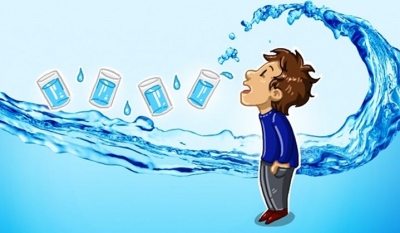
Water does many different jobs. It helps provide a transport system around the body. It also regulates body temperature, and lubricates parts so they work better.
Blood
Blood is mostly water, so it flows easily through blood vessels. Your blood is 92% water. Water carries nutrients and oxygen to all cells in the body.Water is required for breathing.Water moistens oxygen for breathing
Lymph
Watery lymph flows around the body, recycling chemicals and fighting germs. The lymphatic system works to keep body fluid levels in balance and to defend the body against infections. It is made up of a network of lymphatic vessels that carry lymph — a clear, watery fluid that contains proteins, salts, and other substances — throughout the body.
Saliva
Saliva moistens foods to help with eating and also kills germs in the mouth. Saliva is 99% water and 1% protein and salts. The normal daily production of saliva varies between 0.5 and 1.5 liters. The whole unstimulated saliva flow rate is approximately 0.3-0.4 ml / min.
Sweat
Sweat is released through skin pores to help cool the body down. Composed of about 99 percent water, sweat evaporates on the skin’s surface, cooling the body and keeping it from overheating.Sweat secretions help you in other ways, too. They include dermcidin, an antibiotic peptide that appears to regulate bacteria growth on the skin and may fight infection.
Urine
Urine is a mix of excess water and chemicals from the blood. This colorless urine is sometimes due to drinking an excess of water, while other times it can signal a problem with the kidneys. If your urine is consistently clear or absent of color, you should see a doctor.
Joints
Many moving joints have a lubricating layer of liquid, called synovial fluid. With its egg white–like consistency, the principle role of synovial fluid is to reduce friction between the articular cartilage of synovial joints during movement. Synovial fluid is a small component of the transcellular fluid component of extracellular fluid.
Tissue fluids
Body tissues contain water, with lean tissue holding more than fatty tissue. Water is also contained inside organs, in gastrointestinal, cerebrospinal, peritoneal, and ocular fluids. Adipose tissue contains about 10% of water, while muscle tissue contains about 75%.
Cell cytoplasm
Cells need water for the chemical reactions that take place inside them. Water is also in the environment outside the cell. For example, water inside cells makes up about 46 percent of your body’s mass, and water outside the cells in body fluids accounts for another 23 percent.
Picture Credit : Google

